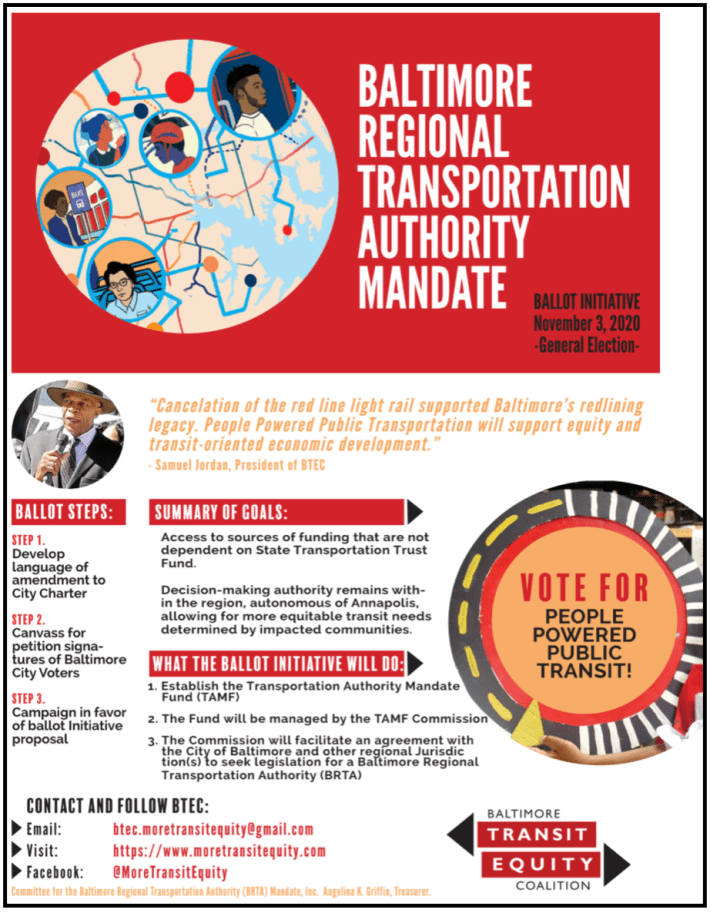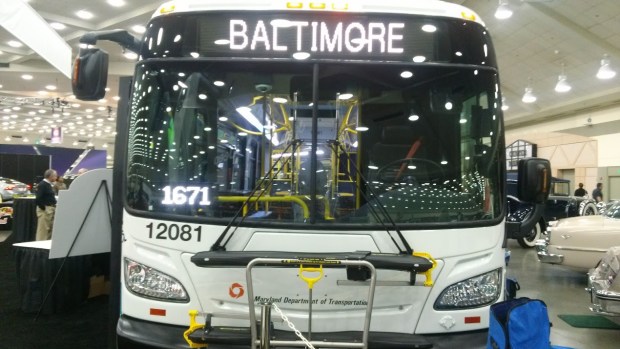A new ballot question initiative in Maryland aims to give Baltimore voters a say in the creation of a city-specific transit agency — which could be a crucial tool in the fight for transportation equity in Charm City, advocates argue.
For nearly half a century, Baltimore has been one of the largest cities in America lacking a regional transit authority. Most if, not all, of the city’s public transit is administered by a sole governing body, the Maryland Transit Administration (MTA). The MTA oversees the State’s network of buses, subway, commuter trains, and light rail.
But budget shortfalls have dogged the underfunded state agency. In recent years, Governor Larry Hogan has proposed drastic cuts to MTA, limiting its ability to keep the system operating optimally. According to the Baltimore Transit Equity Coalition (BTEC), Hogan’s administration failed Baltimore City residents with his decision to cancel the Red Line— a move some claim was racially and politically motivated against low-income families and communities of color who were impacted by the cut.
In 2015, Hogan instead approved the Purple Line, a Washington suburban transit line connecting Bethesda to New Carrollton.
Support for a Regional Transit Authority (RTA) is on the Rise
“Since the Red Line was canceled, we have been strongly advocating for a Regional Transportation Authority (RTA), a supervising entity that would reverse race-based underinvestment in the region,” said Samuel Jordan, President of the Baltimore Transit Equity Coalition. The organization launched a ballot question campaign earlier this year to educate Baltimore City voters on transit equity issues and explore the possibility of getting the region its own RTA.
In May, the Committee for the Baltimore Regional Transportation Authority Mandate, Inc. requested Hogan’s administration and the State Board of Elections (SBE) grant relief to BTEC in order to collect 10,000 petitions by July 27, 2020.
“We are sending emails, making phone calls and using every social media tool at our disposal to connect with Baltimore City voters to reach our goal,” added Jordan. “COVID-19 has severely limited our capacity to engage with constituents, but we are committed to getting our transit ballot question entered this fall.”
BTEC argues that transit-dependent riders would be wise to support a regional transit authority that puts local riders first — because the State authority, historically, hasn’t met their needs.
“The lack of reliable public transit is a key stressor for many of our members, and other working people who are transit-dependent riders,” said Brigette Dumais, a BTEC partner and organizer for 1199SEIU United Healthcare Workers East, Maryland’s largest Healthcare workers union. “A regional transit authority can help break down systemic racial barriers and improve transit equity for the entire region.”
BTEC Aims to Educate and Empower Baltimore City Voters
BTEC’s transit ballot question will allow Baltimore City residents to have an important role in amending the city charter. If enough signatures are obtained by the July deadline, Baltimore City voters will see it in this year's ballot box in the fall.
The proposed transit ballot measure will:
- Establish a Transportation Authority Mandate Fund (TAMF);
- Ensure the fund is managed by the TAMF Commission; and
- Facilitate an agreement among the TAMF Commission, the City of Baltimore, and other regional jurisdictions to seek legislation for a Baltimore Regional Transit Authority (BRTA).
Those components are consistent with a rich and impressive history of rail advocacy in the Baltimore region, the supporters of the measure argue.
“Many residents are surprised to hear that Baltimore has a 160 year old rail worker history,” said Bill Barry, a Baltimore City Green Party member and retired Director of Labor Studies at The Community College of Baltimore County/Dundalk. “During the late 19th century, immigrants and the working-class came together to push for labor reforms,” he added. “The controversies then were the same as the debate over the Red Line now with running tracks through Canton. This is our chance to revitalize rail in the minds of key voters.”

Hogan Administration Rejects Public Transit
This isn’t the first time that Baltimore has made a play to fund an RTA.
In 2019, the Maryland General Assembly (MDGA) with the support of BTEC, passed transit legislation to create a regional transit authority in Baltimore. House Bill 771 and Senate Bill 630 authorized the MDGA to retain an entity and order an independent assessment of the role and impact of a regional transportation authority. However, Gov. Hogan failed to attach critical funds to the pair of bills.
“Hogan’s decision to hold Baltimore back from achieving its economic potential was a mistake, but today voters in response can play an important part in deciding where we go from here,” said Larry Stafford, Executive Director of Progressive Maryland.
Defunding Police to Redirect Monies to Much Needed City Services
At protests around the country, racial justice groups such as Black Lives Matter are changing public opinion about the role of local government spending in creating the conditions for social justice. Some groups are demanding that state and local governments defund policing in order to redirect money to much needed services such as public housing — and public transit, too.
In Baltimore, for every dollar spent on policing, an average of 55 cents is spent on schools, another 5 cents is spent on city job programs, and just 1 cent goes to mental health services and violence prevention. Yet this figure does not include what Baltimore taxpayers pay for the less visible costs of police brutality, including legal fees and settlements following incidents of police misconduct.
After weeks of protests and marches to defund policing at City Hall, on June 16, 2020, the Baltimore City Council approved a budget proposal cutting more than $22 million to the Baltimore Police Department. The measure is now on its way to a final vote — and the region could soon have an opportunity to put that money to a use more consistent with the goal of restorative justice for disadvantaged Marylanders.
It’s in that spirit that BTEC is campaigning to add transit to the ballot. And if the measure succeeds, it could pave the way for vast mobility improvements in the Baltimore region, including a proposed 109-mile rail system with 66 new miles added to the existing 43 miles of Metro Subway and Light Rail lines.
"We haven’t built any new high quality, rapid transit since the Light Rail opened in 1992,” said Eric Norton, Director of Policy and Programs for the Central Maryland Transportation Alliance, a nonprofit focused on transportation issues. "Our existing infrastructure is being neglected, and we won’t be able to build for the future on a crumbling foundation," he stated.
A message from BTEC: To learn more about this initiative, please visit: www.moretransitequity.com or contact BTEC@moretransitequity.com. And if you’re a Baltimore City resident and registered voter, please consider adding your name to the petition and sharing it with five friends. Your support will ensure Baltimore City residents have a fair and open opportunity to speak out for job-enabling transit.
Jaime D. Sigaran is an advocate with the Baltimore Transit Equitable Coalition and member of Progressive Maryland. He lives in Bolton Hill in Baltimore and enjoys all things transit, environment, and politics. He holds a master's degree in Environmental Law and Policy from Vermont Law School as well as a bachelor's degree in Government and Public Policy. Follow him on Twitter at @jdsigaran.







